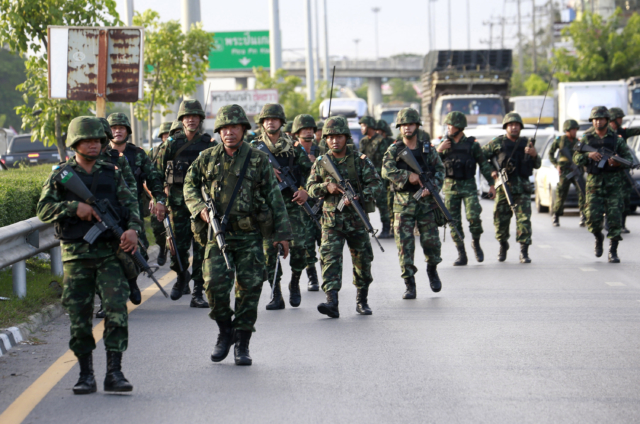Thailand’s army chief General Prayuth Chan-ocha seized control of the government in a coup on Thursday, two days after he declared martial law, saying the military had to restore order and push through reforms after six months of turmoil.
The military declared a 10 p.m. until 5 a.m. curfew, suspended the constitution and told outgoing cabinet ministers to report to an army base in the north of the capital by the end of the day. Rival protest camps were ordered to disperse.
Thailand is locked in a protracted power struggle between supporters of ousted former premier Thaksin Shinawatra and opponents backed by the royalist establishment that has polarized the country and battered its economy.
Twenty-eight people have been killed and 700 injured since the anti-government protests erupted late last year. CCTV’s Tony Cheng, who was there when the decision was made, reports from Bangkok.

Thai Military Seizes Power in Coup, Imposes Curfew
Chaos abounds in Thailand, as the military has officially executed a coup d'etat and removed the caretaker government from power. The military has also imposed a curfew and suspended the constitution. This came as there were ongoing talks between political factions. CCTV's Tony Cheng who was there when the decision was made to take over reports from Bangkok with more.To discuss the significance of the military coup in Thailand, CCTV’s Mike Walter interviews John Brandon, Associate Director of the Asia Foundation in Washington.

John Brandon on Military Coup in Thailand
CCTV's Mike Walter interviews John Brandon, associate director of the Asia Foundation in Washington on military coup in Thailand.To explore the economic impact of the onoging political tensions in Thailand, CCTV’s Phillip Yin speaks to Murray Hiebert, a senior fellow at the Center for Strategic and International Studies’ Southeast Asia Studies department.

Murray Hiebert on Economic Impact of Thai Military Coup
To explore the economic impact of the onoging political tensions in Thailand, CCTV's Phillip Yin speaks to Murray Hiebert, a senior fellow at the Center for Strategic and International Studies' Southeast Asia Studies department.The Thai armed forces have a long history of intervening in politics: there have been 18 previous successful or attempted coups since the country became a constitutional monarchy in 1932, most recently when Thaksin was deposed in 2006.
Footage of coup

 CGTN America
CGTN America Thai soldiers move in to pro-government demonstration site after the coup Thursday, May 22, 2014 on the outskirts of Bangkok, Thailand. Thailand’s army chief Gen. Prayuth Chan-ocha announced a military takeover of the government Thursday, saying the coup was necessary to restore stability and order after six months of political deadlock and turmoil. (AP Photo/Wason Wanichakorn)
Thai soldiers move in to pro-government demonstration site after the coup Thursday, May 22, 2014 on the outskirts of Bangkok, Thailand. Thailand’s army chief Gen. Prayuth Chan-ocha announced a military takeover of the government Thursday, saying the coup was necessary to restore stability and order after six months of political deadlock and turmoil. (AP Photo/Wason Wanichakorn)
